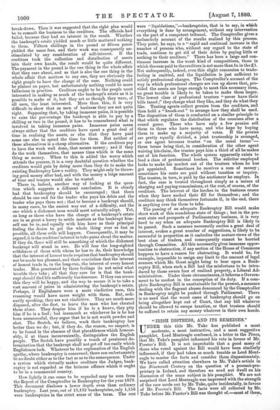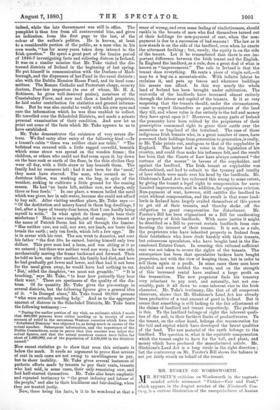"IRISH DISTRESS, AND ITS REMEDIES."
UNDER this title Mr. Take .has published a most moderate, a most instructive, and a most suggestive pamphlet. Lord Monteagle confessed, in a letter to the Times, that Mr. Tuke's pamphlet influenced his vote in favour of Mr. Forster's Bill. It is not improbable that a good many of those who voted against the Bill would have been similarly influenced, if they had taken as much trouble as Lord Mont- eagle to master the facts and consider them dispassionately. We have called attention elsewhere to Mr. Tuke's article in the Nineteenth Century on the question of a peasant-pro- prietary in Ireland, and therefore we need not dwell on his discussion of the same subject in his pamphlet. We are not surprised that Lord Monteagle was impressed with the strength of the case made out by Mr. Take, quite incidentally, in favour of Mr. Forster's Bill. The facts were all collected by Mr. Take before Mr. Forster's Bill was thought of,--most of them,
indeed, while the late Government was still in office. The pamphlet is thus free from all controversial bias, and gives no indication, from the first page to the last, of the colour of the author's politics. He is known, at least to a considerable portion of the public, as a man who, in his own words, "has for many years taken deep interest in the Irish question." He spent a great part of the famine period of 1846-7 investigating facts and relieving distress in Ireland. It was on a similar mission that Mr. Tao visited the dis- tressed districts of Ireland in the beginning of last spring. He put himself in communication with the Duchess of Marl- borough, and the dispensers of her Fund in the rural districts ; also with the Dublin Mansion House Fund, and its local com- mittees. The Roman Catholic and Protestant clergy, country doctors, Poor-law inspectors (to one of whom, Mr. H. A. Robinson, he gives well-deserved praise), members of the Constabulary Force, and now and then a landed proprietor, he laid under contribution for statistics and general informa- tion. But he was also careful to verify with his own eyes and ears the information which he was thus enabled to collect. He travelled over the Scheduled Districts, and made a minute personal examination of their condition. And now let us point out some of the facts which Mr. Mice appears to us to have established.
Mr. Tuke demonstrates the existence of very severe dis- tress. We find entry after entry of the following kind :—In a tenant's cabin " there was neither chair nor table." " The bedstead was covered with a little ragged coverlid, beneath which some straw was spread on the wooden frame ; the children, or others who could not find room upon it, lay down on the bare rock or earth of the floor, in the thin clothes they wear all day, with a little straw or hay beneath them. The family had no resources left ; had it not been for the 'meal,' they must have starved. The man, who seemed an in- dustrious fellow, was working on the bog, in spite of the weather, seeking to cultivate a little ground for the coming season. He had no baste left, neither cow, nor sheep, only three or four fowls.' " In one place, a woman boiled the meal which was given her in salt-water, because she could not afford to buy salt. After visiting another place, Mr. Tuke says :- " Of the destitution and misery found in these bog dwellings, I feel, after a lapse of twenty-four hours, that I can hardly bring myself to write." In what spirit do these people bear their misfortune ? Here is one example, out of many. A tenant of the name of Patrick Burns lost his all through the famine. "Has neither cow, nor calf, nor ewe, nor lamb, nor baste that treads the earth ; only ten fowls, which left a few eggs." He is in arrear with his rent. The son went to America, and sent his father " the first 30s. he earned, leaving himself only two dollars. This poor man had a loom, and was sitting at it as we entered ; but there was neither wool nor warp ; he was only mechanically moving the frame backward and forward. Then he told us how, one after another, his family had died, and how he had gradually got lower and lower, and that had it not been for the meal given away, he would have had nothing to eat. 6 But,' added the daughter, ' we must not grumble.' " " It is touching," says Mr. Tuke, " to hear how patiently they bear their want." These are specimens of the quality of the dis- tress. Of its quantity Mr. Take gives the per-tentage in several districts, but the following figures give a general idea of it. "In Donegal alone," Mr. Tuke found 60,000 persons " who were actually needing help." And as to the aggregate amount of distress in the Scheduled Districts, Mr. Tuke bears the following testimony :— " Daring the earlier portion of my visit, an estimate which I made that 600,000 persons were either needing or in receipt of some amount of relief in the seventeen Western counties which form the ' Scheduled Districts' was objected to, as being much in excess of the actual number. Subsequent information, and the experience of the Dublin Committees, seem to prove that this number was below the actual figures, and that the actual numbers cannot have fallen far short of 1,000,000, out of the population of 2,500,000 in the districts named."
Now recent statistics go to show that even this estimate is below the mark. It needs no argument to prove that arrears of rent in such cases are not owing to unwillingness to pay, but to sheer inability. Mr. Take gives several instances of pathetic efforts made by tenants to pay their rents, tenants who had sold, in some cases, their only remaining cow, and had half-starved themselves. Mr. Tuke also bears emphatic and repeated testimony to "the great industry and labour of the people," and also to their kindliness and fair-dealing, when they are treated justly.
Now, these being the facts, is it to be wondered at that a
sense of wrong, and even some feeling of vindictiveness, should rankle in the breasts of men who find themselves turned out of their holdings for non-payment of rent, when the non- payment is due to a succession of bad seasons ? The law as it now stands is on the side of the landlord, even when he exacts the uttermost farthing ; but, surely, the equity is on the side of the tenant. Let it be remembered that there is one im- portant difference between the Irish tenant and the English. In England the landlord, as a rule, does a great deal of what is known as "improvements." The rule in Ireland is that the tenant does everything. He rents a piece of virgin soil,—it may be a bog on a mountain-side. With infinite labour he reclaims it, and puts up fences and whatever buildings his means can afford. In this way nearly the whole land of Ireland has been brought under cultivation. The rent-rolls of the landlords have increased almost entirely through the labour and capital of the tenants. Is it so very surprising that the tenants should, under the circumstances,. come to regard themselves as part-proprietors of the land they till, and whose value is due entirely to the toil and money they have spent upon it ? Moreover, in many parts of Ireland the peasantry have been robbed by the proprietors of their prescriptive communal right to graze their cattle over the mountain or bog-land of the townland. The case of those indigenous Irish tenants who, in a great number of cases, have possessed their holdings from generation to generation,is really, as Mr. Tuke points out, analogous to that of the copyholder in England. The latter had a voice in the legislation of his country, and could thus make his influence felt, and the result has been that the Courts of Law have always construed " the customs of the manor" in favour of the copyholder, and against the landlord. The Irish tenant or copyholder was disfranchised, and had to submit to the tyranny and cruelty of laws which were made over his head by the landlords. Mr. Gladstone's Land Act has redressed this wrong to some extent, by giving the tenant a legal right to compensation for unex- hausted improvements, and in addition, for capricious eviction. Non-payment of rent, however, still entitles the landlord to evict without compensation, and the result is that some land- lords in Ireland have largely availed themselves of this power to get rid of their tenants, and thereby shake off the
obligation to grant compensation for disturbance. Mr. Forster's Bill has been stigmatised as a Bill for confiscating the property of Irish landlords. With more justice it might be described as a Bill to prevent certain landlords from con- fiscating the interest of their tenants. It is not, as a rule, the proprietors who have inherited property in Ireland from their forefathers who have dealt harshly with their tenants, but extraneous speculators, who have bought land in the En- cumbered Estates Court. In creating this tribunal sufficient care was not taken to secure the rights of the tenants. The consequence has been that speculative brokers have bought properties, not with the view of keeping them, but in order to sell them again at a profit. In some cases these men have doubled and even trebled the rents, and on the strength of this increased rental have realised a large profit on the transaction. The new proprietor finds his tenantry very reluctant to pay rent, and naturally, but not rea- sonably, puts it all down to some inherent vice in the Irish character. Mr. Tuke's testimony, like that of all competent observers, shows that Mr. Gladstone's Land Act has already been productive of a vast amount of good in Ireland. But it seems that something is still lacking to the fair adjustment of the claims of landlord and tenant respectively. The problem is this. To the landlord belongs of right the inherent quali- ties of the soil, to their furthest limits of productiveness. To the tenant, on the other hand, belongs due remuneration for the toil and capital which have developed the latent qualities of the land. The raw material of the earth belongs to the landlord. The question is, what is the equitable compensation which the tenant ought to have for the toil, and plant, and money which have produced the manufactured article. Mr. Gladstone's Land Act is a long stride in the right direction ; but the controversy on Mr. Forster's Bill shows the balance is not yet fairly struck on behalf of the tenant.



































 Previous page
Previous page